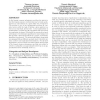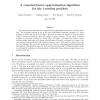2434 search results - page 23 / 487 » Algorithmic Randomness of Closed Sets |
123
click to vote
GECCO
2007
Springer
15 years 8 months ago
2007
Springer
In the longest common subsequence problem the task is to find the longest sequence of letters that can be found as subsequence in all members of a given finite set of sequences....
118
click to vote
KDD
2005
ACM
16 years 2 months ago
2005
ACM
Discovery of sequential patterns is an essential data mining task with broad applications. Among several variations of sequential patterns, closed sequential pattern is the most u...
133
click to vote
JCSS
2002
15 years 1 months ago
2002
We present the first constant-factor approximation algorithm for the metric k-median problem. The k-median problem is one of the most well-studied clustering problems, i.e., those...
131
click to vote
FOCS
2006
IEEE
15 years 8 months ago
2006
IEEE
How much can randomness help computation? Motivated by this general question and by volume computation, one of the few instances where randomness provably helps, we analyze a noti...
104
click to vote
TCS
1998
15 years 1 months ago
1998
Results on random oracles typically involve showing that a class {X : P(X)} has Lebesgue measure one, i.e., that some property P(X) holds for “almost every X.” A potentially m...


